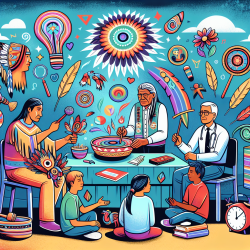Introduction
As a Special Education Director, staying informed about innovative approaches to education is crucial. The research titled "Wak?á?yeža (Little Holy One) - an intergenerational intervention for Native American parents and children" offers valuable insights into addressing trauma within Native American communities. This blog explores how practitioners can apply these findings to enhance their skills and encourage further research.
Understanding the Wak?á?yeža Intervention
The Wak?á?yeža intervention is a culturally-based program designed to break cycles of intergenerational trauma, suicide, and substance use among Fort Peck Assiniboine and Sioux parents and their children. This program integrates community health workers and cultural lesson-components, making it a unique approach to addressing trauma and enhancing parenting skills.
Key Outcomes and Applications
The research highlights several outcomes that can be applied in special education settings:
- Reducing Parental Stress: The intervention significantly decreases parenting stress and trauma-related symptoms. Practitioners can incorporate stress-reduction techniques into their programs to support parents in managing stress effectively.
- Improving Parenting Skills: By using components of the Family Spirit program, the intervention enhances parenting practices. Educators can develop workshops to teach positive parenting techniques, focusing on monitoring and nurturing.
- Promoting Cultural Identity: The inclusion of cultural components promotes positive tribal identity and communal mastery. Schools can collaborate with cultural leaders to integrate cultural teachings into the curriculum, fostering a sense of identity and community among students.
Encouraging Further Research
The Wak?á?yeža intervention demonstrates the potential of culturally-based programs in reducing parental distress and improving child outcomes. Practitioners are encouraged to conduct further research to explore the effectiveness of similar interventions in different cultural contexts. This can lead to the development of tailored programs that address the unique needs of diverse communities.
Conclusion
The Wak?á?yeža intervention offers a promising approach to addressing trauma and enhancing parenting skills within Native American communities. By applying these findings, practitioners can improve their skills and contribute to the development of culturally-sensitive educational programs. To read the original research paper, please follow this link: Wak?á?yeža (Little Holy One) - an intergenerational intervention for Native American parents and children: a protocol for a randomized controlled trial with embedded single-case experimental design.










